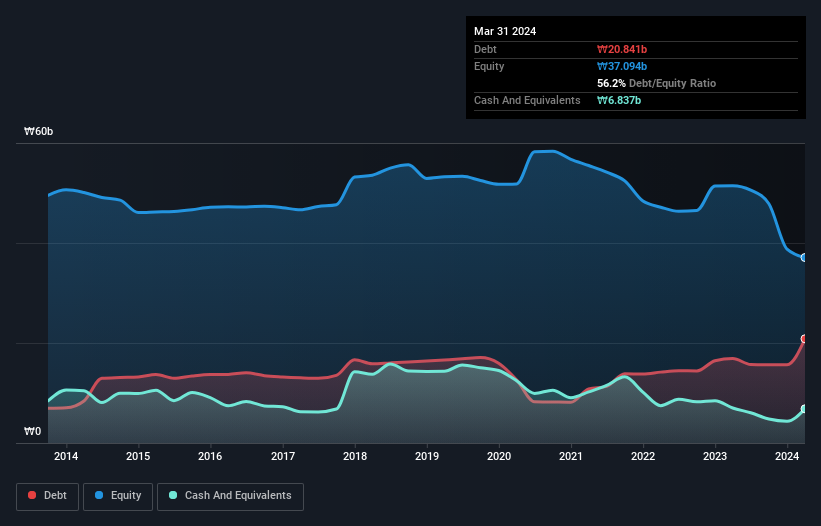- South Korea
- /
- Pharma
- /
- KOSDAQ:A034940
Would ChoA Pharmaceutical (KOSDAQ:034940) Be Better Off With Less Debt?

Some say volatility, rather than debt, is the best way to think about risk as an investor, but Warren Buffett famously said that 'Volatility is far from synonymous with risk.' When we think about how risky a company is, we always like to look at its use of debt, since debt overload can lead to ruin. We can see that ChoA Pharmaceutical Co., LTD. (KOSDAQ:034940) does use debt in its business. But should shareholders be worried about its use of debt?
Why Does Debt Bring Risk?
Generally speaking, debt only becomes a real problem when a company can't easily pay it off, either by raising capital or with its own cash flow. In the worst case scenario, a company can go bankrupt if it cannot pay its creditors. However, a more usual (but still expensive) situation is where a company must dilute shareholders at a cheap share price simply to get debt under control. Of course, debt can be an important tool in businesses, particularly capital heavy businesses. The first thing to do when considering how much debt a business uses is to look at its cash and debt together.
Check out our latest analysis for ChoA Pharmaceutical
What Is ChoA Pharmaceutical's Net Debt?
You can click the graphic below for the historical numbers, but it shows that as of March 2024 ChoA Pharmaceutical had ₩20.8b of debt, an increase on ₩16.9b, over one year. On the flip side, it has ₩6.84b in cash leading to net debt of about ₩14.0b.

A Look At ChoA Pharmaceutical's Liabilities
The latest balance sheet data shows that ChoA Pharmaceutical had liabilities of ₩31.5b due within a year, and liabilities of ₩7.37b falling due after that. On the other hand, it had cash of ₩6.84b and ₩22.7b worth of receivables due within a year. So its liabilities outweigh the sum of its cash and (near-term) receivables by ₩9.31b.
Given ChoA Pharmaceutical has a market capitalization of ₩48.8b, it's hard to believe these liabilities pose much threat. Having said that, it's clear that we should continue to monitor its balance sheet, lest it change for the worse. When analysing debt levels, the balance sheet is the obvious place to start. But it is ChoA Pharmaceutical's earnings that will influence how the balance sheet holds up in the future. So if you're keen to discover more about its earnings, it might be worth checking out this graph of its long term earnings trend.
Over 12 months, ChoA Pharmaceutical made a loss at the EBIT level, and saw its revenue drop to ₩62b, which is a fall of 9.9%. We would much prefer see growth.
Caveat Emptor
Over the last twelve months ChoA Pharmaceutical produced an earnings before interest and tax (EBIT) loss. Indeed, it lost a very considerable ₩10b at the EBIT level. When we look at that and recall the liabilities on its balance sheet, relative to cash, it seems unwise to us for the company to have any debt. So we think its balance sheet is a little strained, though not beyond repair. Another cause for caution is that is bled ₩2.7b in negative free cash flow over the last twelve months. So in short it's a really risky stock. When analysing debt levels, the balance sheet is the obvious place to start. However, not all investment risk resides within the balance sheet - far from it. To that end, you should learn about the 2 warning signs we've spotted with ChoA Pharmaceutical (including 1 which is a bit concerning) .
When all is said and done, sometimes its easier to focus on companies that don't even need debt. Readers can access a list of growth stocks with zero net debt 100% free, right now.
If you're looking to trade ChoA Pharmaceutical, open an account with the lowest-cost platform trusted by professionals, Interactive Brokers.
With clients in over 200 countries and territories, and access to 160 markets, IBKR lets you trade stocks, options, futures, forex, bonds and funds from a single integrated account.
Enjoy no hidden fees, no account minimums, and FX conversion rates as low as 0.03%, far better than what most brokers offer.
Sponsored ContentNew: AI Stock Screener & Alerts
Our new AI Stock Screener scans the market every day to uncover opportunities.
• Dividend Powerhouses (3%+ Yield)
• Undervalued Small Caps with Insider Buying
• High growth Tech and AI Companies
Or build your own from over 50 metrics.
Have feedback on this article? Concerned about the content? Get in touch with us directly. Alternatively, email editorial-team (at) simplywallst.com.
This article by Simply Wall St is general in nature. We provide commentary based on historical data and analyst forecasts only using an unbiased methodology and our articles are not intended to be financial advice. It does not constitute a recommendation to buy or sell any stock, and does not take account of your objectives, or your financial situation. We aim to bring you long-term focused analysis driven by fundamental data. Note that our analysis may not factor in the latest price-sensitive company announcements or qualitative material. Simply Wall St has no position in any stocks mentioned.
About KOSDAQ:A034940
ChoA Pharmaceutical
ChoA Pharmaceutical Co., Ltd. operates as a pharmaceutical company in South Korea.
Mediocre balance sheet low.
Market Insights
Community Narratives




